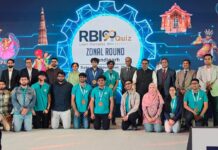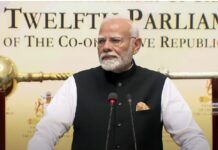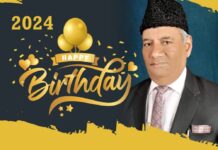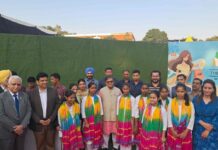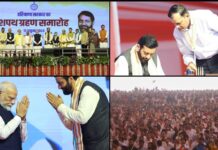Chandigarh March 25, 2021
‘Government of India has declared mandatory testing and certification guidelines for
all the Telecommunication Products to be launched in India’ said Ms. Deepa Tyagi,
Senior DDG and Head, Telecommunication Engineering Centre (TEC), DoT, Government of
India while delivering 3rd Sat Pal Memorial Lecture on Telecommunication organized
by University Institute of Engineering and Technology(UIET), Panjab University in
Online Mode today. TEC does the testing and certification by involving various
laboratories spread across country. Surveillance of products under MTCTE is carried
out by Licensed Service Area (LSA) field unit of DoT.
Ms. Deepa Tyagi stated that India is a major entity in telecommunications as
it has the second largest telecommunication network, largest number of data
consumers, and there is AI penetration in all top sectors. Several challenges need
to be addressed such as lack of Internet access for all citizens, unreliable power
supply in few rural areas, digital illiteracy. Role of standardization to ensure
interoperability of devices is fulfilled by Standards Development Organizations
(SDOs) like International Telecommunication Union(ITU), Institute of Electrical and
Electronics Engineers(IEEE), European Telecommunication Standards Institute(ETSI),
International Organization for Standardization(ISO), 3rd Generation Partnership
Project, oneM2M (Machine to Machine) and TEC. She traced the evolution of 5G
starting from 1G analog, 2G digital, 3G mobile data, 4G mobile broadband to 5G
having extreme speed, reliability and connectivity. Several 5G usage scenarios
include areas of enhanced mobile broadband, massive machine type communications,
ultra-reliable and low latency communications. Potential applications of such human-
human, human-machine and machine-machine communications exist in rural broadband,
enabling smart cities, fleet management of food grains, etc. She also discussed
deployment strategies of 5G worldwide including various challenges in Internet of
Things(IoT), technical challenges include connectivity, reliability, cost, policy
challenges include IPR, data localization, governance and some common challenges
like standards, interoperability, security and privacy.
She also shared that 10-Digit number which we use currently for the mobile
phones will not be sufficient for the future usage of machine-2-machine
communication where billions of devices will be connected. TEC has recommended the
use of 13-digit numbering system for SIM based devices. Even 128-bit IP address will
also need revision in future. Artificial Intelligence (AI) and Machine Learning (ML)
will shape the future of communication. There is need to have an India specific
stack for AI and standardization in AI has already been started. Network
technologies beyond 2030 will be Holographic Type Communication, Tactile Internet
for Remote Operations, Intelligent Operation Network, Digital Twin, Space-
Terrestrial Integrated Network, Industrial IoT with cloudification.
She also discussed Blockchain technology which is an immutable distributed
ledger-based system with no central authority. It has been used successfully in the
USA for COVID vaccination distribution. She presented potential use cases of
Blockchain technology in telecom networks in the areas of IoT connectivity and its
services, prevention of roaming frauds, enablement of 5G, identity as a service etc.
Professor Raj Kumar, Vice-Chancellor, Panjab University congratulated the
Team UIET for organizing the lecture and expected that the Bharti Chair Endowment
will contribute in a more significant way.
Professor J. K. Goswamy, Director UIET stressed on understanding the basic
need of communication and thereafter to work on the different use cases for
research. He emphasized that the social aspects of developments in telecommunication
technology should be given due consideration.
Professor Pamela Kumar, Visiting Professor Bharti Chair, introduced the
distinguished speakers and set the context for the lecture and the vision for future
activities. Dr. Veenu Mangat proposed vote of thanks for the guests, Bharti
Enterprises group, organizers and all attendees.
Earlier, Professor Sakshi Kaushal welcomed all the guests and introduced Sh.
Sat Paul Mittal who was elected twice to Rajya Sabha for a term of six years each in
1976 and 1982. United Nations decorated him with the prestigious United Nations
Peace Medal in 1987.
Professor Harish Kumar shared the research activities of Bharti Chair in the
last couple of years. Telecom Research Lab is working on different products along
with participating in ITU, 3GPP, OneM2M activities. Plan for next 2 years will focus
on research in the area of development of Telecommunication Use Cases for Healthcare
and Agriculture.
Bharti Chair in Information Technology and Telecommunications was
established in UIET, Panjab University in 2002 by Bharti Telecom Group in the memory
of Late Sh. Sat Paul Mittal, a visionary leader. For this purpose, endowment was
given by Sh. Sunil Bharti Mittal, Chairman, Bharti Enterprises for enhancement of
knowledge in the field of telecommunication.
200+ faculty/ research scholars/ students along with external stakeholders
participated in Virtual Mode. Team from Bharti Enterprises represented by Ms. Mickey
Khindria and Mr. Ashutosh Kalia, as nominated by Sh. Rakesh Bharti Mittal, Vice-
Chairman also participated as panelists in the session. Lecture was also live
Telecast on Panjab University’s social media accounts like Facebook, YouTube.
Recording of the lecture is also available on:
Facebook Link: https://www.facebook.com/events/2957377197856434/
You Tube Link: https://youtu.be/EjN610pwNcE


